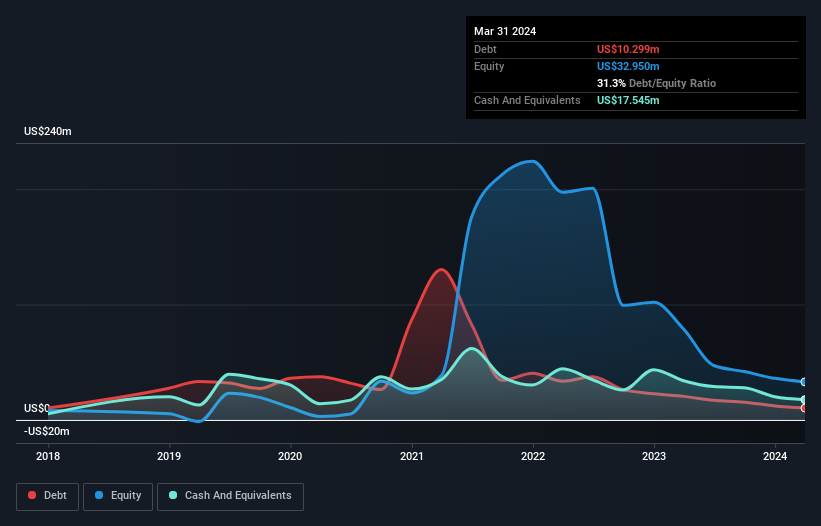- United States
- /
- Consumer Durables
- /
- NasdaqCM:ATER
Does Aterian (NASDAQ:ATER) Have A Healthy Balance Sheet?
Legendary fund manager Li Lu (who Charlie Munger backed) once said, 'The biggest investment risk is not the volatility of prices, but whether you will suffer a permanent loss of capital.' When we think about how risky a company is, we always like to look at its use of debt, since debt overload can lead to ruin. As with many other companies Aterian, Inc. (NASDAQ:ATER) makes use of debt. But the real question is whether this debt is making the company risky.
Why Does Debt Bring Risk?
Debt is a tool to help businesses grow, but if a business is incapable of paying off its lenders, then it exists at their mercy. Part and parcel of capitalism is the process of 'creative destruction' where failed businesses are mercilessly liquidated by their bankers. However, a more usual (but still expensive) situation is where a company must dilute shareholders at a cheap share price simply to get debt under control. Having said that, the most common situation is where a company manages its debt reasonably well - and to its own advantage. The first thing to do when considering how much debt a business uses is to look at its cash and debt together.
See our latest analysis for Aterian
How Much Debt Does Aterian Carry?
As you can see below, Aterian had US$10.3m of debt at March 2024, down from US$20.4m a year prior. However, it does have US$17.5m in cash offsetting this, leading to net cash of US$7.25m.

How Strong Is Aterian's Balance Sheet?
Zooming in on the latest balance sheet data, we can see that Aterian had liabilities of US$22.3m due within 12 months and liabilities of US$378.0k due beyond that. Offsetting these obligations, it had cash of US$17.5m as well as receivables valued at US$2.38m due within 12 months. So it has liabilities totalling US$2.80m more than its cash and near-term receivables, combined.
Given Aterian has a market capitalization of US$17.4m, it's hard to believe these liabilities pose much threat. Having said that, it's clear that we should continue to monitor its balance sheet, lest it change for the worse. While it does have liabilities worth noting, Aterian also has more cash than debt, so we're pretty confident it can manage its debt safely. There's no doubt that we learn most about debt from the balance sheet. But it is future earnings, more than anything, that will determine Aterian's ability to maintain a healthy balance sheet going forward. So if you want to see what the professionals think, you might find this free report on analyst profit forecasts to be interesting.
Over 12 months, Aterian made a loss at the EBIT level, and saw its revenue drop to US$128m, which is a fall of 40%. To be frank that doesn't bode well.
So How Risky Is Aterian?
By their very nature companies that are losing money are more risky than those with a long history of profitability. And we do note that Aterian had an earnings before interest and tax (EBIT) loss, over the last year. And over the same period it saw negative free cash outflow of US$6.0m and booked a US$54m accounting loss. While this does make the company a bit risky, it's important to remember it has net cash of US$7.25m. That kitty means the company can keep spending for growth for at least two years, at current rates. Overall, we'd say the stock is a bit risky, and we're usually very cautious until we see positive free cash flow. When analysing debt levels, the balance sheet is the obvious place to start. But ultimately, every company can contain risks that exist outside of the balance sheet. These risks can be hard to spot. Every company has them, and we've spotted 4 warning signs for Aterian you should know about.
When all is said and done, sometimes its easier to focus on companies that don't even need debt. Readers can access a list of growth stocks with zero net debt 100% free, right now.
New: Manage All Your Stock Portfolios in One Place
We've created the ultimate portfolio companion for stock investors, and it's free.
• Connect an unlimited number of Portfolios and see your total in one currency
• Be alerted to new Warning Signs or Risks via email or mobile
• Track the Fair Value of your stocks
Have feedback on this article? Concerned about the content? Get in touch with us directly. Alternatively, email editorial-team (at) simplywallst.com.
This article by Simply Wall St is general in nature. We provide commentary based on historical data and analyst forecasts only using an unbiased methodology and our articles are not intended to be financial advice. It does not constitute a recommendation to buy or sell any stock, and does not take account of your objectives, or your financial situation. We aim to bring you long-term focused analysis driven by fundamental data. Note that our analysis may not factor in the latest price-sensitive company announcements or qualitative material. Simply Wall St has no position in any stocks mentioned.
About NasdaqCM:ATER
Aterian
Operates as a technology-enabled consumer products company in North America, Chile, Colombia, Argentina, and internationally.
Adequate balance sheet and fair value.
Similar Companies
Market Insights
Community Narratives



